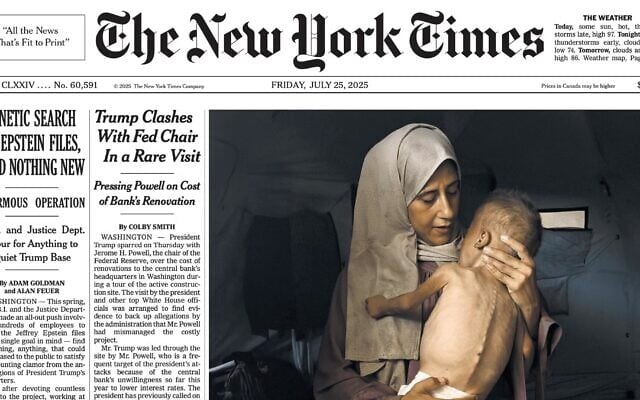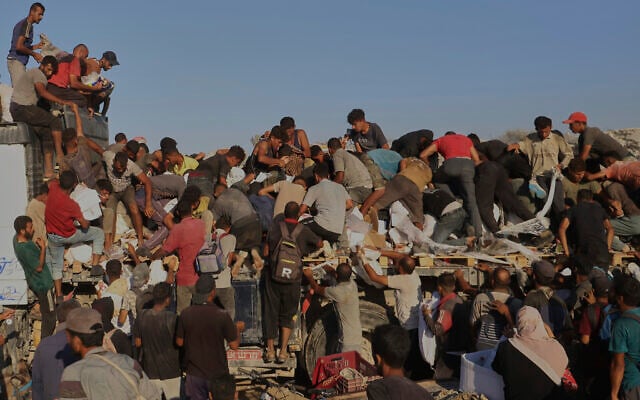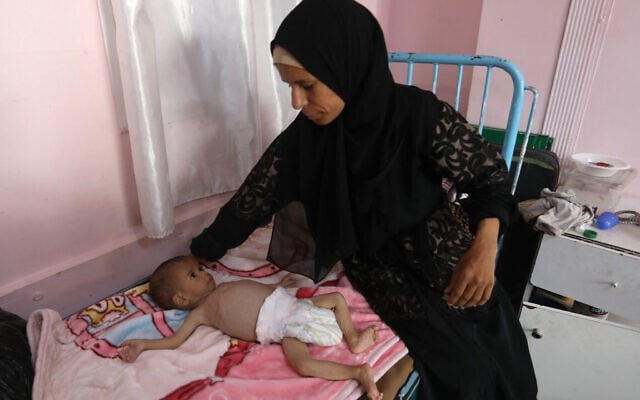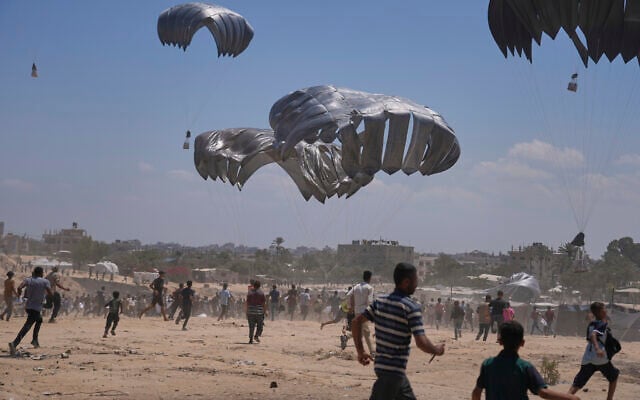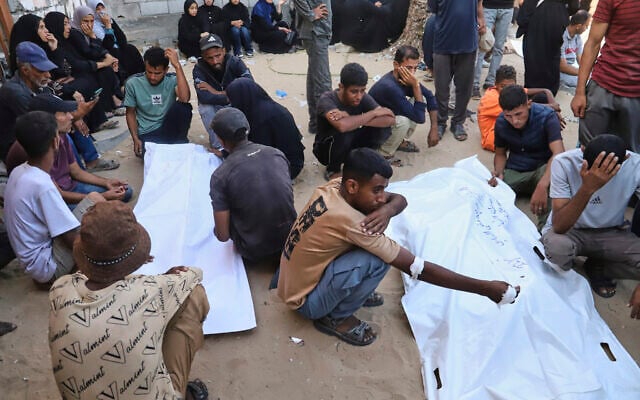


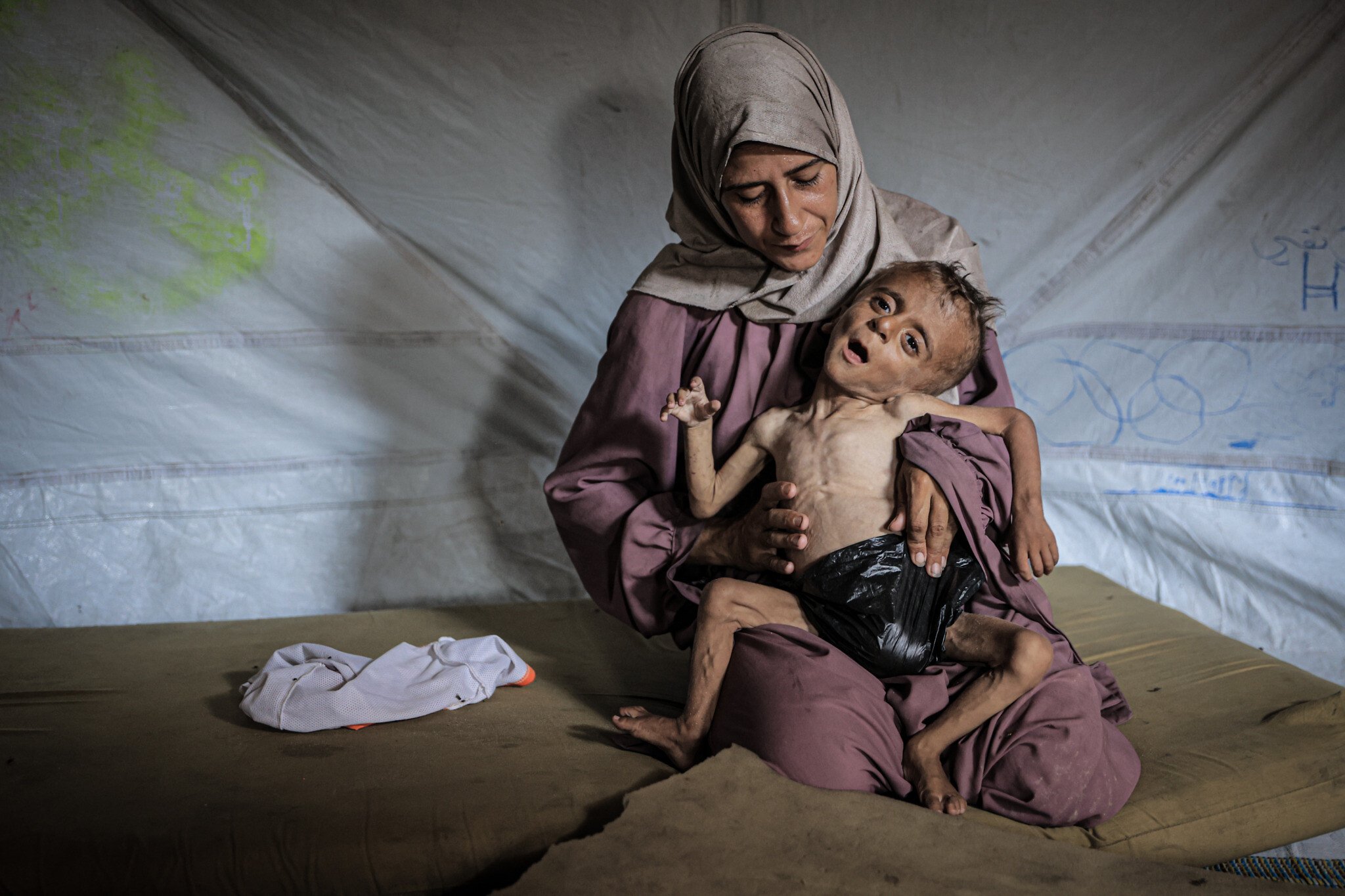
Images of Muhammad al-Mutawaq, a severely emaciated 18-month-old living in Gaza, which were published on the front pages of newspapers around the world two weeks ago, prompted a global outcry about the humanitarian crisis in Gaza.
But an exposé revealing that al-Mutawaq suffered from severe illnesses, including neurological and muscle disorders, prompted intense denunciations of the international press by prominent Israeli officials and allies.
They accused the publications of falsely misrepresenting the boy’s emaciated condition as reflecting the general humanitarian situation in Gaza, resulting from Israel’s restrictions on the entry of humanitarian aid into Gaza, and failing to do due diligence on the full causes of al-Mutawaq’s severe malnutrition.
The Times of Israel itself published a picture of al-Mutawaq to illustrate a story about a High Court of Justice decision giving the state a tenth extension for its response to petitions demanding the government allow more aid into the devastated territory.
Now however, two senior Israeli doctors, including the head of the pediatric gastroenterology unit at one of Israel’s premier medical institutions, have insisted that al-Mutawaq’s severely emaciated state is not the result of his preexisting medical conditions alone.
Speaking to The Times of Israel, they insisted that no child suffering from such diseases in Israel or most other Western countries would be so skeletal or display such severe malnutrition, and that he was likely in such condition due to an inability to access the proper nutritional supplements.
“You categorically do not find kids looking like that in Israel or Western countries,” said Prof. Dan Turner, the head of a pediatric gastroenterology unit at one of Israel’s most respected hospitals located in Jerusalem and Deputy Dean of the School of Medicine at the Hebrew University.
“Even patients with background diseases should not be malnourished like that. A patient like that would be admitted to hospital,” Turner added, although he noted that he did not know exactly what disease al-Mutawaq is suffering from.
Outlets such as CNN reported al-Mutawaq’s mother as stating her that son required special nutritional supplements to treat his disease and that several hospitals had told her he urgently needs those supplements, which were not available in Gaza.
On March 2, Israel imposed a 10-week blockade on the entry of all humanitarian aid into Gaza, including food, medicine, and critical humanitarian supplies, which remained in effect until May 18.
Following this period, a trickle of aid was allowed into Gaza, alongside the commencement of aid distribution operations by the controversial Gaza Humanitarian Foundation organization, which provides packages of dry food goods. Those packages do not, however, include baby formula, and medical workers and humanitarian agencies have reported on severe shortages of formula in Gaza even after the end of the full blockade, with some groups resorting to smuggling it into the war-torn territory.
Israel has vociferously denied placing any restrictions on baby formula and denied that there is a shortage.
Dr. Michal Palton, a senior pediatric doctor and department head at another prestigious Israeli hospital, made similar comments to Turner.
“I’ve been a pediatrician for 20 years and we never see kids looking like this, even very chronically ill children. When we do, we would suspect abuse and would contact the police, said Palton.
“Kids don’t look like that. He was starving and hungry despite whatever condition he has.”
Palton noted that some children suffering from the kind of disease al-Mutawaq reportedly has might be fed only fluid nutrition in the form of some type of milk formula, noting that there are many such patients in Israel.
“Maybe he was previously fed on formula, and wasn’t able to get it for months,” Palton suggested.
Al-Mutawaq’s mother told CNN that just a few months ago her son weighed nine kilograms but has since dropped to just six kilos, a timeline which could correlate with Israel’s total blockade of aid into Gaza between March and May.
Turner, too, pointed to the lack of a specialized nutritional formula in Gaza as likely a key cause behind al-Mutawaq’s emaciated condition.
“How much special formula did he have and in what way does he get it?” asked the doctor.
“If you’re in north Gaza, you can only dream of getting formula to babies,” he added, noting the especially severe humanitarian situation in the northern part of the territory.
“I have seen children with severe diseases for the last 20 years, and I don’t see children like that, and if I do it’s due to poor adherence to therapy and neglect.”
Al-Mutawaq and his family live in northern Gaza, currently in a tent near the Al-Ahli Al-Arabi hospital in Gaza City, according to CNN.
The UN’s Office for the Coordination of Humanitarian Affairs (OCHA) agency reported last month that at the beginning of July, 8.8 per cent of 56,440 children evaluated throughout Gaza showed acute malnutrition, up from 2.4 per cent in February, and 6 per cent in June.
The situation was even worse in Gaza City, where the rate of acute malnutrition rose from 4% in February to 16% in July.
One of the three parameters for famine defined by the Integrated Food Security Phase Classification organization, which monitors global food insecurity and famine, is that 30% of children suffer from acute malnutrition.
Israel has denied that there is a famine in Gaza, although a senior Israeli security official told reporters in mid-July Tuesday that actions needed to be taken to “stabilize the humanitarian situation.”
The IDF subsequently announced at the end of July that 10-hour humanitarian pauses in fighting would be implemented to facilitate the provision of aid to Gaza and that aid airdrops would be resumed, even conducting an airdrop itself for the first time during the current war.
The COGAT agency of the Defense Ministry has insisted that there is enough aid to provide for Gazans’ nutritional needs, and that the failure to distribute it lies with UN agencies, although humanitarian aid experts have strongly rejected those claims
Turner pointed out that even if many children in Gaza are not suffering from such severe malnutrition as Al-Mutawaq, that did not disprove the reality that others, especially among the most vulnerable groups, are suffering from severe malnutrition.
“We need to understand that it shouldn’t be surprising that the most malnourished picture comes from a child with a background disease.
“Actually, that is to be expected, because malnutrition doesn’t occur equally in everyone, it affects children, the elderly, and the socially weak [first].”
Turner also had sharp words for those denying that there is a humanitarian crisis in Gaza and that the government’s restrictions on aid have brought it about.
“Personally, I don’t think limiting food to a population regardless of the war aims should be on the table for the Jewish people and the State of Israel,” he said.
He pointed to the frequent scenes of thousands of Gazans mobbing aid trucks and walking long distances to aid distribution hubs where hundreds of civilians have been shot dead as indicators of how desperate the civilian population in the territory is for food.
“Why would someone risk their lives at four o’clock in the morning to get one can of rice, if they’re not hungry?” he demanded.
“We have created the hunger games in a population that is now under our full control. Our values should not permit us to go there.”
The professor expressed deep concern for what he said was moral decline in Israel over the last nearly two years of war.
“We have had a good compass over four thousand years for what is right and wrong… We are not the same people anymore; we are declining as a nation. Our values have kept us together in the most difficult periods of history, and we are losing these values, and this is the biggest threat to the Jewish people,” he said.
“We need to behave properly not because they [the Palestinians] deserve it but because we have values, we are human, we have values we maintained for thousands of years which is the main reason why we need to remember who we are, and who we are not, and I think we have got confused about this over the last two years.
“Building our lives on the ruins of the lives of other people — there is no blessing in it.”

